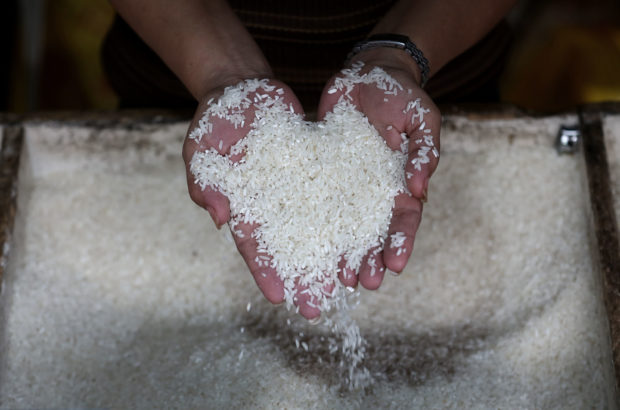Palace, solons, traders press NFA over ‘bukbok’

INFESTED RICE About 300,000 tons of imported rice are sitting at the ports in Subic Bay Freeport and Tabaco, Albay, as authorities try to quell a weevil (“bukbok”) infestation that Malacañang and lawmakers are demanding explanations for from the National Food Authority. —RICHARD A. REYES
The National Food Authority (NFA) has “a lot of explaining to do” with regard to the 330,000 bags of weevil-infested imported rice now sitting at the ports of Subic Bay Freeport and Tabaco, Albay, Malacañang said on Friday.
Presidential spokesperson Harry Roque said 250,000-metric tons of imported rice cost P6 billion of the people’s money.
“So, with P6 billion, why are there weevils?” he said in an interview with dzRH radio.
“They are saying the delay (in unloading the rice) was caused by continuous rains. But I think the NFA has a lot of explaining to do why it took them so long [to deliver the rice],” Roque said.
Old shipments
Article continues after this advertisementThe Samahang Industriya ng Agrikultura (Sinag), an umbrella group representing various agricultural stakeholders, including those engaged in rice, livestock and poultry trading, has one explanation—the government may have bought year-old rice stocks.
Article continues after this advertisement“Traders from Thailand offered to sell to us some of their rice shipments earlier this year, but we found them powdery and already with odor, so we declined,” Sinag’s Rosendo So quoted a local importer as saying.
He said the importer, who is from Bulacan and distributes rice all over Luzon, requested anonymity.
“As rice traders, they would of course sell their old shipments first … Old shipments are cheaper, but they are more prone to infestation” So said the local importer told him.
According to the NFA, one ship carrying rice from Thailand arrived at Poro Point in La Union in June and then proceeded to Subic early this month. Another ship arrived in Tabaco, also early August.
Workers started unloading the shipment in Subic last week and in Tabaco over the weekend. It was only then that the NFA was able to inspect the shipments and found them infested with weevils, or “bukbok.”
‘Normal occurence’
However, NFA spokesperson Rex Estoperez said the infestation was a “normal occurrence” in rice shipments.
“The infestation is beyond our control … We cannot control the temperature of the shipments during its transport. This has happened before and suppliers fumigate the rice at no cost to the government,” Estoperez said.
Estoperez said imported rice immediately undergo an “aging test” upon arrival to determine the current shelf life of the staple.
Under NFA’s importation guidelines, the rice must be at least four months old before delivery, NFA planning director Rocky Valdez said.
Opposition Sen. Francis Pangilinan, who has called for a Senate inquiry into the emerging rice crisis, on Friday said the “pile of questions” senators wanted to ask of the NFA “keeps getting higher and higher.”
“The NFA cited inclement weather as the reason for the infestation. Is it another issue of lack of planning? Or did the imported rice arrive already infested?” he said.
Supplier liable
Pangilinan reiterated his call for the NFA officials, including its head, Jason Aquino, to resign.
Roque said the government had not incurred any damage yet because the supplier was still liable for the rice since the NFA had not officially received the shipments.
He acknowledged the remedies taken by the NFA, including fumigating the rice.
“The question still is: Why did it take so long to deliver [the rice]?” he said. “Considering it’s the people who are paying, they really need to find a way to avoid this and look for solutions.”
Safety
Pangilinan said the question of the safety of fumigated rice, as claimed by NFA authorities, was most important.
Anakpawis Rep. Ariel Casilao said methyl bromide was commonly used in fumigation. The chemical, however, produces neurological symptoms and high concentrations may cause death through pulmonary injury and associated circulatory failure.
“Would this government guarantee that no residue will end up being consumed by the poor?” Casilao asked.
“The real solution to the rice crisis is self-sufficiency, with regions and provinces, able to produce their own stocks of rice, and with the government procuring these at good farm-gate prices, to keep it away from monopoly traders whose primary mission in life is to profit, then sell it at low prices to poor consumers,” the lawmaker said.